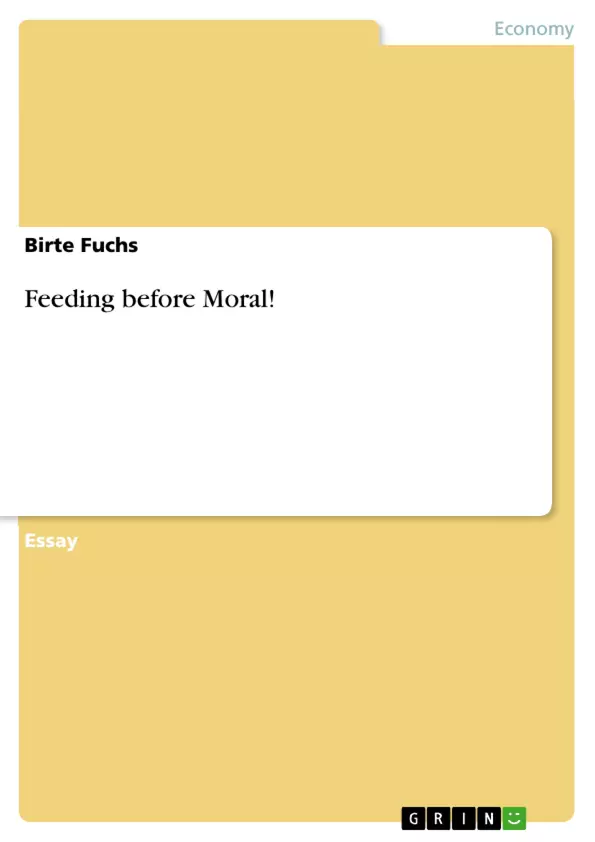Feeding before moral!
If you type in “losers of the financial crisis” at google.com you will find many articles about all kinds of different losers that have suffered due to the crisis. There are the poor millionaires who lost half their fortune, women who feel discriminated by the new stimulus package of Barack Obama, bank chairmen who were used to bonus payments in the amount of millions and got now laid back or even arrested by the Public Prosecution Service and even the nannies and personal yoga coaches who are on the top of everybody’s cross-off list had to fear for their jobs. The situation is still strained, even four years after the big meltdown.
Everybody knows the feeling of uncertainty if an appointment for a professional finance advice is scheduled. This uncertainty increased extremely due to the financial crisis. Questions like: ”Do I really get a customer-oriented advice?”,- “Is this product the right choice for me?”, and “Are there no hidden risks?” are familiar to all of us. These thoughts are justified because one of the consequences of the banking crisis was that many banks are now depending on the support of the state which leads to rising pressure within the banks. Due to this, the employees get pressurized to observe their required goal which then leads to non-customer-oriented advice.
Inhaltsverzeichnis (Table of Contents)
- Feeding before moral!¹
- The consequences of the financial crisis for the banking industry
- The new legislation
- The opposite side
- The pressure upon the employees and the influence on the investors
Zielsetzung und Themenschwerpunkte (Objectives and Key Themes)
This essay examines the ethical challenges posed by the pressure on bankers to provide non-customer-oriented advice following the financial crisis. It explores the effectiveness of regulatory measures like product information sheets and "fake customers" in combating this pressure and ensuring ethical behavior.- The impact of the financial crisis on the banking industry
- The ethical dilemma of pressure on bankers
- The effectiveness of regulatory measures
- The consequences of unethical advice for investors
- The role of financial education in protecting investors
Zusammenfassung der Kapitel (Chapter Summaries)
- Feeding before moral!¹: This introductory section sets the context by highlighting the widespread impact of the financial crisis and the various "losers" it created. It emphasizes the feeling of uncertainty surrounding financial advice and the ethical concerns it raises.
- The consequences of the financial crisis for the banking industry: This section discusses the pressure banks face due to state support and the resulting consequences for customer-oriented advice. It introduces the concept of ethical problems arising from this pressure.
- The new legislation: This section focuses on the introduction of the sales sheet, a regulatory measure designed to increase transparency and protect investors from non-customer-oriented advice. It explains the contents of the sales sheet and its potential benefits.
- The opposite side: This section presents the opposing view, arguing that the regulatory measures implemented, including the sales sheet, "fake customers," and consulting protocols, are ineffective in preventing unethical advice. It provides personal anecdotes and highlights the limitations of these measures.
- The pressure upon the employees and the influence on the investors: This section explores the personal experiences of bank employees working under intense pressure. It provides real-life examples of how this pressure affects their mental well-being and can lead to unethical practices, ultimately impacting investors. It also highlights the vulnerability of senior investors who may rely heavily on their bank advisors and can become victims of misleading advice.
Schlüsselwörter (Keywords)
This essay focuses on the ethical dilemmas within the banking industry following the financial crisis. It explores the impact of pressure on bankers, the effectiveness of regulatory measures like the sales sheet and "fake customers," and the consequences of unethical advice for investors. Key terms include: customer-oriented advice, ethical behavior, financial crisis, product information sheet, "fake customers," pressure on bankers, regulatory measures, investor protection, financial education.Frequently Asked Questions
What is the "Feeding before moral!" dilemma in banking?
It refers to the ethical challenge where bankers prioritize meeting sales goals and bank profits over providing honest, customer-oriented advice.
How did the financial crisis change the banking industry?
Many banks became dependent on state support, leading to increased internal pressure on employees to achieve specific targets, often at the expense of the investor.
What are "product information sheets" (sales sheets)?
They are regulatory measures designed to increase transparency by providing clear information about the risks and costs of financial products to protect investors.
Are "fake customers" effective in ensuring ethical advice?
The essay discusses the opposing view that measures like mystery shopping (fake customers) and consulting protocols are often ineffective in preventing unethical practices.
Which group is most vulnerable to misleading financial advice?
Senior investors are highlighted as particularly vulnerable because they often rely heavily on their advisors and may lack modern financial education.
- Quote paper
- Birte Fuchs (Author), 2011, Feeding before Moral!, Munich, GRIN Verlag, https://www.grin.com/document/193028



